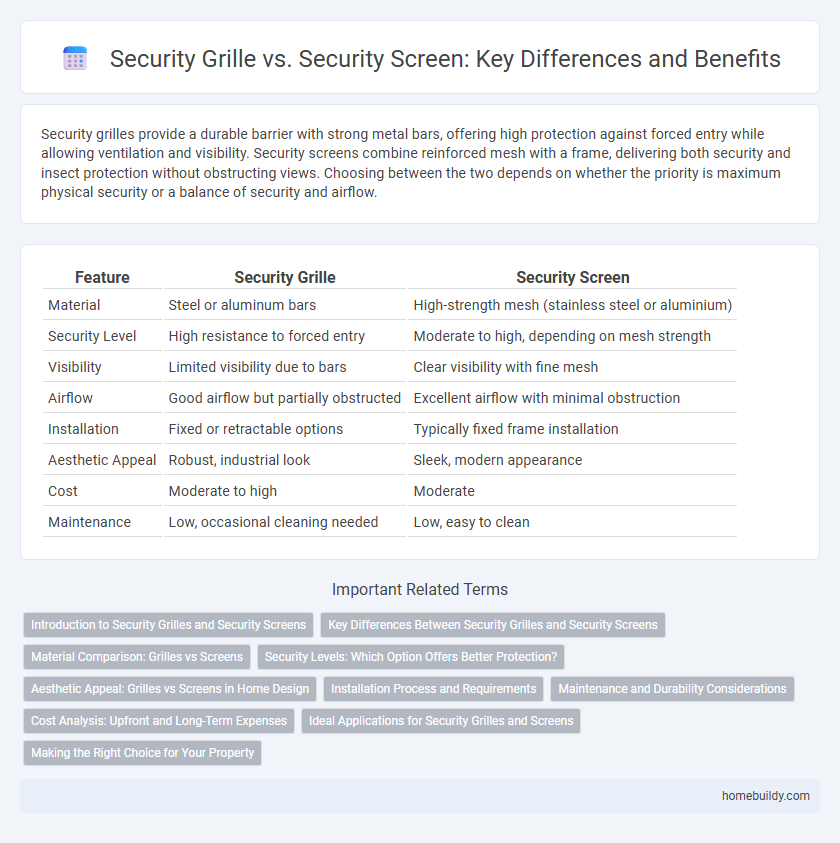Security grilles provide a durable barrier with strong metal bars, offering high protection against forced entry while allowing ventilation and visibility. Security screens combine reinforced mesh with a frame, delivering both security and insect protection without obstructing views. Choosing between the two depends on whether the priority is maximum physical security or a balance of security and airflow.
Table of Comparison
| Feature | Security Grille | Security Screen |
|---|---|---|
| Material | Steel or aluminum bars | High-strength mesh (stainless steel or aluminium) |
| Security Level | High resistance to forced entry | Moderate to high, depending on mesh strength |
| Visibility | Limited visibility due to bars | Clear visibility with fine mesh |
| Airflow | Good airflow but partially obstructed | Excellent airflow with minimal obstruction |
| Installation | Fixed or retractable options | Typically fixed frame installation |
| Aesthetic Appeal | Robust, industrial look | Sleek, modern appearance |
| Cost | Moderate to high | Moderate |
| Maintenance | Low, occasional cleaning needed | Low, easy to clean |
Introduction to Security Grilles and Security Screens
Security grilles are rigid metal barriers designed primarily for physical protection, offering high strength and durability to prevent unauthorized access through windows or doors. Security screens combine mesh technology with impact-resistant materials, providing a balance of visibility, ventilation, and security by resisting forced entry and insect intrusion. Choosing between security grilles and security screens depends on priorities such as security level, aesthetic preference, and functional requirements like airflow and light penetration.
Key Differences Between Security Grilles and Security Screens
Security grilles offer robust physical barriers composed of metal bars or mesh that provide high impact resistance and visibility while allowing airflow, making them ideal for securing large openings. Security screens combine fine mesh material with durable frames to prevent insect entry alongside security protection, emphasizing visibility and ventilation but with slightly less impact resistance compared to grilles. The primary differences lie in material composition, level of physical security, airflow, and insect prevention capabilities, with security grilles focusing on strength and security and security screens balancing protection with pest control.
Material Comparison: Grilles vs Screens
Security grilles are typically constructed from heavy-gauge steel or aluminum bars arranged in a fixed or retractable pattern, providing robust physical protection against forced entry. In contrast, security screens use high-tensile stainless steel mesh designed to resist cutting, impact, and corrosion while maintaining visibility and airflow. The choice between grilles and screens largely depends on the desired balance of strength, aesthetics, and ventilation needs, with grilles offering superior rigidity and screens excelling in subtle security integration.
Security Levels: Which Option Offers Better Protection?
Security grilles typically provide higher security levels due to their robust metal construction and fixed installation, making them resistant to forced entry and suitable for high-risk environments. In contrast, security screens offer moderate protection with a focus on impact-resistant mesh materials that prevent tampering but may not withstand heavy physical attacks. Choosing between security grilles and security screens depends on the required security grade, with grilles favored for maximum protection and screens ideal for balancing security and visibility.
Aesthetic Appeal: Grilles vs Screens in Home Design
Security grilles offer a bold, architectural aesthetic with their sturdy metal bars that can be customized in various patterns to enhance a home's exterior design. Security screens provide a more subtle appearance with fine mesh that maintains visibility and airflow while blending seamlessly into doors and windows. Choosing between grilles and screens depends on balancing visual impact with the desired level of transparency and curb appeal in home security solutions.
Installation Process and Requirements
Security grilles typically require professional installation due to their heavy-duty metal components and precise fitting within door or window frames, ensuring maximum strength and durability. Security screens, often made from lighter materials like mesh, usually offer simpler installation processes suitable for DIY projects, requiring basic tools and minimal alterations to existing structures. Both products demand accurate measurements and secure fastening, but security grilles often involve more complex mounting hardware and structural support to maintain their robust protective function.
Maintenance and Durability Considerations
Security grilles require minimal maintenance due to their robust metal construction, offering long-lasting durability against physical impacts and weather conditions. In contrast, security screens often demand more frequent upkeep to prevent corrosion and maintain their protective mesh integrity. Durability considerations favor security grilles for high-impact resistance, whereas security screens provide enhanced ventilation but may need regular inspections to ensure continued effectiveness.
Cost Analysis: Upfront and Long-Term Expenses
Security grilles generally have a lower upfront cost compared to security screens due to simpler materials and installation processes but may require more frequent maintenance, potentially increasing long-term expenses. Security screens, while initially more expensive because of advanced materials and design for enhanced durability, often provide better resistance to damage and lower maintenance costs over time. Evaluating total cost of ownership involves balancing upfront investment against longevity, repair frequency, and potential replacement costs.
Ideal Applications for Security Grilles and Screens
Security grilles are ideal for high-traffic commercial settings, providing robust physical barriers without obstructing airflow or visibility. Security screens suit residential applications, offering insect protection combined with security features, enhancing safety while maintaining aesthetic appeal. Choosing between the two depends on the priority of ventilation and visual openness versus insect prevention and residential security.
Making the Right Choice for Your Property
Security grilles provide robust physical barrier protection with durable metal bars ideal for deterring forced entry and enhancing property security. Security screens combine fine mesh with a strong frame, offering added insect protection alongside security, suitable for ventilation without compromising safety. Choosing between a security grille and a security screen depends on your priorities: maximum security and visibility or balanced protection with airflow.
Security grille vs Security screen Infographic

 homebuildy.com
homebuildy.com